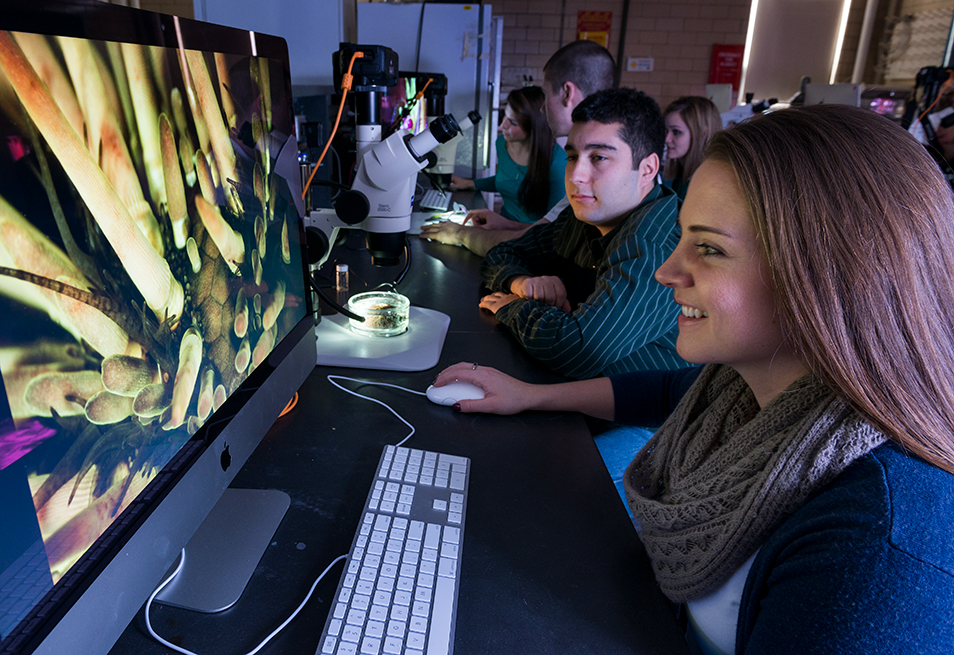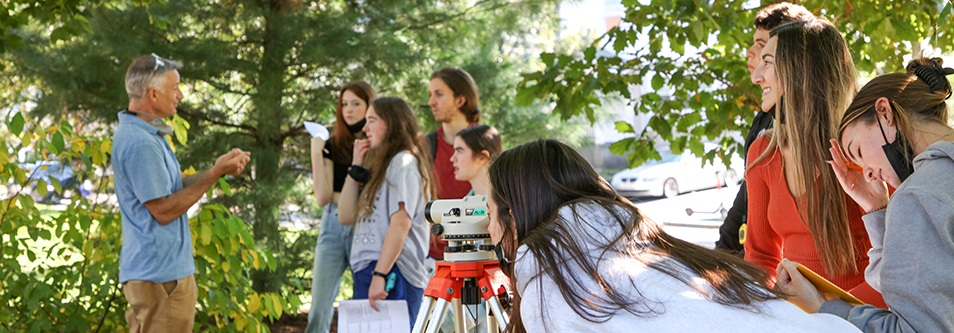Degrees & Programs
Our department offers several programs of study — each specific to the post-graduate plans of our students. We invite you to explore each major and minor program we offer to see which one best fits you. Complete degree requirements for all academic programs can be found in the course catalog.
Majors
Biology (B.A. or B.S.)
The Bachelor of Arts (B.A.) program allows students sufficient flexibility to explore a breadth of interests and still acquire an in-depth of knowledge of the sciences.
The Bachelor of Science (B.S.) program is designed to meet the needs of students primarily interested in science and who intend to pursue graduate study and research in the biological sciences, careers in the health professions, or careers in other science related fields.
In addition to the College’s general degree requirements, all majors must complete:
- General Biology
- General Chemistry
- Organic Chemistry
- General Physics
- Calculus
- Introduction to Cell and Molecular Genetics
And some combination of lecture-based (e.g., Biology of Cancer, Cell Signaling) and lab-based (e.g., Genetics, Human Anatomy, Physiology) upper level science courses.
Environmental Biology (B.S.)
The B.S. program is designed to prepare students for graduate studies and careers in research or applied environmental fields (e.g., environmental consulting). The foundations for the Environmental Biology major are ecology, environmental science, evolution, and conservation.
In addition to the College’s general degree requirements, all majors must complete:
- General Biology
- General Chemistry
- Calculus
- Biogeochemistry: Nutrients, Cycles and Global Change
- Foundations of Environmental Biology
- Biostatistics
- Environmental Methods & Statistical Analysis
And some combination of lecture-based (e.g., Evolution), field-based (e.g., Tropical Biology, Animal Behavior, Pollination Ecology), and lab-based upper level science courses.
Biology/Secondary Education (B.A. or B.S.)
The Secondary Education program, accredited by the Rhode Island Department of Education, has trained students with a passion for teaching to lead science, foreign language, language arts, and math classrooms in high schools throughout the country.
The B.A. program provides certification in Biology and General Science. The B.S. program provides the same however, more biology electives/lab courses are covered.
In addition to the college’s general degree requirements, all majors must complete:
- General Biology
- General Chemistry
- Organic Chemistry
- General Physics
- Calculus
- Introduction to Cell and Molecular Genetics
Various Education courses (e.g., Education Psychology, Educational Measurement, Teaching Science in Secondary Schools).
And some combination of Biology electives with labs and science electives (e.g., Physiology, Microbiology, Ecology).
Double Major or Creating an Individualized Major
Students are offered the opportunity to initiate and develop combined curricular programs that they feel may better meet their needs than a single concentration. The double major requires that the student complete all degree requirements in the two departments elected. Several biology students each year elect a double major, most often in biology/chemistry.
The individualized program is designed for students whose needs transcend specific disciplines and that require a special curricular format. For example, a student with an interest in medical illustration may design a program incorporating courses in both biology and art but need not necessarily complete a major in both.
Minor
Evolutionary Biology and Ecology
The minor provides a strong foundation in organismal and population biology and related disciplines. It features a strong hands-on component involving course work, laboratory experiences, and field studies. Six courses, totaling 22-23 credits, are required.

Graduate & Beyond
3 + 4 Optometry
We offer a combined degree program with the New England College of Optometry. This program is designed for the highly motivated student with a professional goal in optometry. It allows for completion of the B.A. or B.S. degree in biology and the O.D. degree (doctor of optometry) in seven years, rather than the usual eight. The first three years at PC offer a blend of liberal arts, basic, and biological sciences, which will prepare students for professional study. The next four years at New England College of Optometry (NECO) provide the coursework required to complete the PC baccalaureate degree, as well as the professional training required for the doctoral degree in optometry.
Pre-graduate Preparation in Biology
Both the B.A. and B.S. degree programs are acceptable for admission to graduate schools specializing in the biological sciences. Most graduate programs look more favorably on students who have a B.S. due to the more rigorous requirements of the degree. Students who are planning to pursue post-graduate education should consult with our pre-graduate school advisor as early as possible in their second year.
Premed Preparation in Biology
Both the B.A. and B.S. degree programs meet the science requirements demanded for admission to professional schools specializing in the health sciences such as medicine, dentistry, optometry, and veterinary medicine. Most students interested in the health professions major in biology. However, some students whose interests lie in other areas may elect to major in non-science department, while still successfully completing the prerequisites for medical, dental, veterinary, or optometry school admission. Students who are planning for a career in the medical sciences should consult with the Advisor for Health Professions early in their freshman year.
Recommendations for Undeclared Students
Students interested in the biology major or pre-medical preparation should consider the following recommendations:
- Before undertaking serious exploration of a major in biology, students are asked to consult with the chairperson of the department and/or the advisor for the health professions.
- Freshman biology majors are normally required to take four specific courses including General Biology, General Chemistry, Calculus, and Development of Western Civilization. This is NOT RECOMMENDED FOR THE UNDECLARED STUDENT. Instead they should take General Biology (with lab), Calculus, Development of Western Civilization, and one elective/general degree requirement each semester in their freshman year. These courses, with the exception of the electives, are two-semester sequential courses required of freshman biology and pre-medical students. An undeclared student who decides NOT to pursue the biology or pre-medical course of study, but who has completed this freshman year schedule, will have completed the general degree requirement in science and mathematics.
IMPORTANT NOTE: Any student considering these courses should first consult with BOTH the appropriate undeclared advisor and the biology department chairperson. This recommendation is made with the intention of preventing serious academic difficulties that might otherwise be encountered.
What You Can Do With a Biology Degree
- Allergist
- Ophthalmologist
- Oncologist
- Dietitian
- Anesthetist
- Phlebotomist
- Crime Lab Technician
- Forensic Pathologist
- Geneticist
- Oceanographer
- Virologist
- Zoologist
- Cell Biologist
- Water Quality Controller
- Endocrinologist
- Science Editor/Writer
- Genetic Counselor
Areas of Graduate Study
- Medicine
- Dentistry
- Optometry
- Veterinary Medicine
- Podiatry
- Physical Therapy
- Physicians Assistant
- Microbiology
- Molecular Biology
- Botany
- Marine Biology
- Ecology
- Conservation Biology
- Evolutionary Biology
Thomas Magaldi ’06

Director, Science Alliance The New York Academy of Sciences
The education and training that I received at PC prepared me to successfully complete a Ph.D. in genetics at Yale University, where I studied tumor viruses. The balance of science and liberal arts courses also helped me develop into a well-rounded professional. In today’s economy, it is not only important to be a great critical thinker. You also must be a good at writing, communicating, leading, and working with others. At the time, I did not realize the importance of taking Development of Western Civilization in parallel with courses in biology, physics, and chemistry. However, I now realize that these courses provided me with diverse set of skills that I use every day.
Department of Biology
Science Complex
1 Cunningham Square Providence, Rhode Island, 02918
Julie Coccia
Administrative Assistant
Science Complex Administrative Suite 0106A
401.865.2585
401.865.1438
jcoccia@providence.edu
Dr. Patrick Ewanchuk
Department Chair
Science Complex Administrative Suite 0106
401.865.2394
ewanchuk@providence.edu






